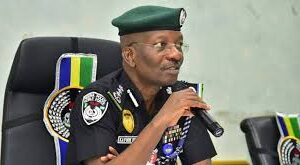On Wednesday, December 10, 2014, newly constructed Military Working Dogs Kennels were commissioned by the Chief of Army Staff, COAS, Lieutenant General Kenneth Minimah. JIBRIN BABA NDACE reports
From the ancient times, Dogs have been part of warfare as ‘war dogs’ in combat, as scouts, as sentries and trackers.Research have shown that ‘War dogs’ were used the Egyptians, Greeks, Persians, Sarmatians, Alans, Slavs, Britons, and the Romans in various battles. Contemporary dogs in military roles are also often referred to as police dogs, or in the United States as a Military Working Dog (MWD), or K-9. As of 2011, 600 U.S. Military dogs were actively participating in the conflicts in Iraq and Afghanistan.
In line with global trends and the need to assist in the ongoing counter-terrorism and counter-insurgency operations in Nigeria, the Military Police Corps of Nigerian Army is working assiduously to increase its MWDs. The led to commissioning of new blocks for MWDs at the Army Headquarters Provost Dog Platoon, Shehu Musa Yar’adua Barracks, Abuja.
In his remarks, the Chief of Army Staff (COAS) Lieutenant General Kenneth Minimah commended the initiative of the Corps of Military Police adding that specially trained MWDs on explosives detection, search and rescue operations and other areas in counter-terrorism and counter-insurgency have so far been deployed in various operational theatres in the North East.
“The present security challenges bedeviling our country and sub-region calls for concerted efforts by all officers and soldiers to enhance the capacity of the Nigerian Army in whatever little way they can. I strongly believe that we all can contribute towards improving the Nigerian Army for better performance in the discharge of its Consitutional roles. It is for this reason that I commend this laudable initiative of the Corps of Military Police.”
Minimah who disclosed that injection of MWDs into Operation ZAMAN LAFIYA have yielded dividends thanked the National Security Adviser, Colonel Sambo Dasuki for acquiring the dogs to be accommodated in the kennels.
He said the Dog section was established by his predecessor, Lieutenant General Azubuike Ihejirika (rtd) in 2012 in order to enhance the operational efficiency and effective of the service in the fight against insurgency.
“In the past 11 months of my leadership of the Nigerian Army, efforts have been made to re-equip, re-train and task-organize the Nigerian Army to effectively tackle contemporary national security challenges, particularly in the North Eastern part of the country. One of such efforts is the K9 component of the Nigerian Army which was established in 2012 and which has contributed tremendously to support ongoing Nigerian Army operations nationwide. The Military Working Dogs (MWDs) have been employed for several duties including detection of explosive and search and rescue operations.”
In his welcome address, the Provost Marshal, Nigerian Army (PM {A), Major General PAT Akem disclosed that the Nigerian Army in keeping with current best practices resuscitated its K9 component which was moribund for several years adding that the increase in the numbers of MWDs necessitated the construction of new kennels.
“ This was to assist in the ongoing counter-terrorism and counter-insurgency operations especially in the North East. Given the increasing utility and versatility of the MWDs, the NACMP embarked on a breeding programme to increase our holdings. Additionally, the Office of the National Security Adviser (ONSA) donated MWDs to us.”
The Provost Marshal who said the commissioning of the kennel would increase the efficiency of the MWDs and the capacity of their deployment adding that increasing need for deployment of MWDs within the FCT and its environs call for upgrade of AHQ Provost Dog Platoon to a Company status.
Underscoring the importance of the Military Police Corps and its MWDs in the ongoing operations in the North East and other areas within Nigeria, Major General Akem disclosed that the military police units are organised and equipped to provide the combat commander with versatile, responsive force capable of performing a wide range of security duties as a way of providing combat support.
He said MWDs are used effectively by the armed forces during combat in United States, Pakistan, Australia and Canada.
“In the United States for instance, every combat group or marine unit proceeding on any operation has military police sub units attached to it to provide security for the combat forces. Apart from it firepower, K9 units provided by MP lend additional support. For instance, under the auspices of International Security Assistance Force (ISAF), a NATO-led formation that operates in Afghanistan, the military police K9 provide security for combat units during operations. The same roles are undertaken by MP in Pakistan, Australian and Canadian forces.”
Major General Akem said MWDs are trained in many skills which can make a difference between success or failure in many combat missions. He listed some of the deployment potentials of MWDs to include: cache searches, force protection sweeps, building sweeps, entry control points and access control points, open area search, cordon and search and route clearance.
He said military police do more law enforcement and VIP protection roles that were recognized within the Nigerian Army circles.
“General, during security and mobility support, military police units provide combat power to protect the mission command headquarters, equipment, and services that are essential for mission success as prioritized by the joint force commander or geographic combatant commander.”
“Military police also implement countermeasures, which may include implementing vulnerability assessments, developing procedures to detect terrorists’ actions before they occur, hardening likely targets, and conducting offensive operations to destroy an enemy. Military police units actively use checkpoints and road blocks to control the movement of vehicles, personnel and material to prevent illegal actions that may aid the enemy. These control measures serve as deterrent to terrorist activicties and saboteurs and other threats. ”



